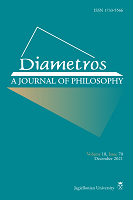Dual-Process Theory as a Theory of the Classification of Information Processing Acts
Dual-Process Theory as a Theory of the Classification of Information Processing Acts
Author(s): Vitaliy NadurakSubject(s): Philosophy, Psychology, Cognitive Psychology
Published by: Instytut Filozofii Uniwersytetu Jagiellońskiego
Keywords: dual-process theory; information processing; reasoning; intuition; classification;
Summary/Abstract: The article proposes a consideration of the dual-process theory of higher cognition as a theory of the classification of acts of information processing. One of the reasons why the dual-process approach has been criticized is the fact that the information processing process can sometimes have characteristics that undermine a clear-cut attribution to one of the two traditionally defined opposite types. To avoid this criticism, it is proposed that the object of classification should not be the processes of information processing, but separate acts of combining two units of information. Unlike a process, a particular act of information processing at a particular moment in time cannot simultaneously have opposite characteristics, nor can it simultaneously have and not have some characteristic. In order to show the qualitative difference between various information processing acts as falling individually into either Type 1 or Type 2 processing, it is proposed to classify them by a feature that is present in one type and absent in another. It is suggested to take conscious control as such a feature. As a result, in the information processing acts corresponding to Type 2 category, units of information are combined in a consciously controlled way, whereas in the acts to be considered as Type 1, those units either already are combined or combine autonomously due to the existence of indirect associative connections.
Journal: Diametros
- Issue Year: 18/2021
- Issue No: 70
- Page Range: 48-63
- Page Count: 16
- Language: English

